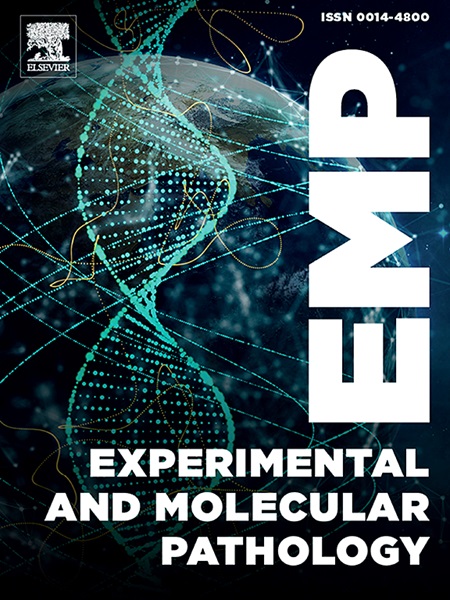雌激素通过与雌激素受体结合诱导巨噬细胞的选择性活化
IF 3.7
4区 医学
Q2 PATHOLOGY
引用次数: 0
摘要
与年龄有关的伤口受损是造成老年人相当高发病率和死亡率的主要健康负担。当损伤发生时,单核细胞迁移到受损部位并分化为组织内巨噬细胞,这对伤口修复至关重要。为了适当地解决炎症反应,巨噬细胞分化为两种不同的表型,即经典激活的促炎巨噬细胞和交替激活的抗炎巨噬细胞。促炎巨噬细胞通常与促炎事件有关,而抗炎巨噬细胞被认为是促进再生的。年龄相关的伤口修复延迟通常归因于年龄相关的局部和全身雌激素水平的下降。然而,尽管雌激素在伤口愈合中的抗炎作用得到了充分的证明,但迄今为止,雌激素和雌激素受体(ERs)在巨噬细胞极化中的作用却很少得到关注。为了研究雌激素和内质网对巨噬细胞极化的影响,在LPS/IFN-γ或IL-4/IL-13刺激单核细胞源性巨噬细胞之前,分别用雌激素、er - α激动剂/拮抗剂或er - β激动剂/拮抗剂预处理单核细胞源性巨噬细胞,产生促炎或抗炎巨噬细胞。我们的研究结果证实,雌激素通过可能的ER-α信号传导促进巨噬细胞的选择性激活。用PPT等药物选择性靶向ER-α可能会导致治疗受损伤口过度炎症的新疗法的发展。本文章由计算机程序翻译,如有差异,请以英文原文为准。
Estrogen induces the alternative activation of macrophages through binding to estrogen receptor-alpha
Age-related impaired wounds represent a major health burden resulting in considerable morbidity and mortality in the elderly. When injury occurs, monocytes migrate to the damaged site and undergo differentiation into tissue-resident macrophages, which are crucial for wound repair. For proper resolution of the inflammatory response, macrophages differentiate into two distinct phenotypes classified as classically-activatedpro-inflammatory and alternatively-activatedanti-inflammatory macrophages. Pro-inflammatory macrophages are commonly linked with pro-inflammatory events, while anti-inflammatory macrophages are known to be pro-regenerative. The age-related delay in wound repair is often attributed to the age-related decrease in local and systemic estrogen levels in both genders. However, despite its well-documented anti-inflammatory effect in wound healing, the role of estrogen and involvement of Estrogen Receptors (ERs) in macrophage polarization has gained little attention to date. To investigate the impact of estrogen and ERs on the polarization of macrophages, monocyte-derived macrophages were pre-treated with estrogen, ER-alpha agonist/antagonist or ER-beta agonist/antagonist prior to stimulation with LPS/IFN-γ or IL-4/IL-13 to produce pro-inflammatory or anti-inflammatory macrophages. Our findings confirm that estrogen promotes the alternative activation of macrophages via possible ER-α signalling. Selective targeting of ER-α with agents like PPT could potentially lead to the development of novel therapies to treat excessive inflammation in impaired wounds.
求助全文
通过发布文献求助,成功后即可免费获取论文全文。
去求助
来源期刊
CiteScore
8.90
自引率
0.00%
发文量
78
审稿时长
11.5 weeks
期刊介绍:
Under new editorial leadership, Experimental and Molecular Pathology presents original articles on disease processes in relation to structural and biochemical alterations in mammalian tissues and fluids and on the application of newer techniques of molecular biology to problems of pathology in humans and other animals. The journal also publishes selected interpretive synthesis reviews by bench level investigators working at the "cutting edge" of contemporary research in pathology. In addition, special thematic issues present original research reports that unravel some of Nature''s most jealously guarded secrets on the pathologic basis of disease.
Research Areas include: Stem cells; Neoangiogenesis; Molecular diagnostics; Polymerase chain reaction; In situ hybridization; DNA sequencing; Cell receptors; Carcinogenesis; Pathobiology of neoplasia; Complex infectious diseases; Transplantation; Cytokines; Flow cytomeric analysis; Inflammation; Cellular injury; Immunology and hypersensitivity; Athersclerosis.

 求助内容:
求助内容: 应助结果提醒方式:
应助结果提醒方式:


